May is National Physiotherapy Month
Physiotherapists and physical rehabilitation therapists (PRTs) are important members of the McGill University Health Centre’s (MUHC) healthcare team. They work with a wide variety of patients, helping them recover their strength, movement and mobility after illness, injury or post-surgery. Part teachers, part coaches, these professionals help our patients get back on their feet. Meet some of our rehabilitation experts.
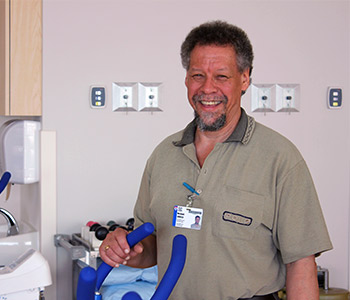
Michael Grosse
As Michael Grosse enters the stunning new physiotherapy gymnasium at the MUHC’s Glen site, he says: “Things are kicking back into normal. Most of our equipment is already here, and we’re treating our patients as usual.”
Grosse is Outpatient Coordinator in the adult Physiotherapy Department at the Glen and oversees patient flow, making sure patients are seen as quickly as possible. He also performs his duties as a physiotherapist, treating patients with a wide variety of conditions on a regular basis. Good physiotherapists, he says, need “excellent people and teaching skills”.
“Clinical conditions become fairly routine after a while, but all people are different. Some people catch exercises easily, and others need more guidance,” he says. “We need to understand how a problem affects each patient as an individual so that we can help them heal.”
Grosse believes that as rehabilitation experts, physiotherapists will play a larger role in hospitals, clinics and rehabilitation centres in the future.
“This is a fast growing profession that’s challenging and enriching,” he says.
![]()
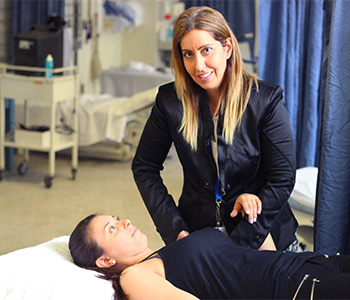
Filiz Avsar
Physiotherapist Filiz Avsar works in the outpatient clinic at the Montreal General Hospital (MGH) and sees a variety of patients who need rehabilitation after injury or illness.
“We use manual therapy and different machines to help patients recover after fractures, traumatic brain injuries, breast cancer surgery, etc.,” she explains. “We want them to regain their strength, movement and mobility as much as possible.”
The work environment at the MGH allows Avsar to “take time with patients and give them quality treatment.”
“Some cases are complex, and we must address patients’ anxiety or fear as well as their injury,” she says. “And we have to encourage them a lot.” Avsar enjoys the challenge of accompanying patients until they are well enough to leave the hospital.
“In many other jobs, you don’t see the effect you have on patients,” she says. “But here, we see them from post-surgery or injury to healing. We know we’ve done something to help them.”
![]()
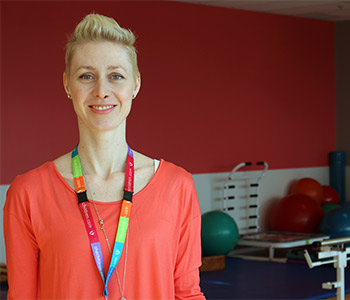
Marie-Hélène Pilon
As a physiotherapist at the Montreal Children’s Hospital for over 15 years, Marie-Hélène Pilon works with a variety of children with a multitude of conditions and illnesses. “Most of the patients I see range from newborns to kids as old as 5,” she explains. “They can have a variety of challenges, ranging from developmental and motor skill delays to more complex pediatric neurologic disorders.”
Pilon is also actively involved in treating patients with brachial plexus injuries and is the only physiotherapist at the Children’s who specializes in working with these types of patients, working closely with a plastic surgeon to determine if each patient is a candidate for surgery and following them post-op.
A mother of two children, aged 7 and 9, Pilon says physiotherapy was an ideal career choice for her because it married three of the things she enjoys the most: working with children, staying active and helping others.
Having just moved to her brand new space at the new Montreal Children’s Hospital at the Glen site, Pilon says she looks forward to being able to work with patients in a brand new environment. “The physiotherapy gym has a beautiful view of the city and is very bright and welcoming for families,” she says.
![]()
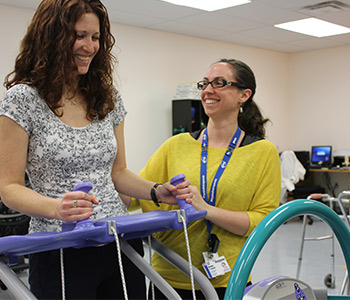
Mélanie St-Gelais
“I like re-empowering patients,” says Melanie St-Gelais, a physiotherapist at the Montreal Neurological Hospital who helps patients regain autonomy after brain surgery. “The movements I teach my patients make them feel better. It’s very rewarding.”
St-Gelais first sees patients in their rooms a day after surgery. “We evaluate patients and help them get out of bed and walk. When they need more rehabilitation, they come to the gym.”
She’s thrilled with the Neuro’s newly renovated gymnasium, a spacious, colourful and well-equipped room.
“This is a lively place, and patients like it too,” she says. “They can see other patients who are already walking and think ‘I’ll be there one day’. Or, the opposite, they see a newcomer and think ‘Oh, I’ve made so much progress!’”
“Physiotherapists are part teachers and part coaches,” she says. “And we all have something in common: the love of movement!”
![]()
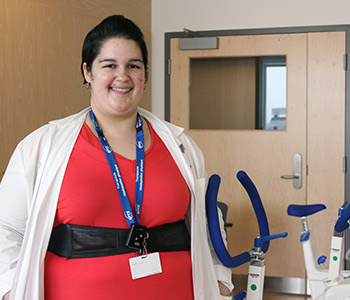 Marie Danielle Blanchette
Marie Danielle Blanchette
Marie Danielle Blanchette has always wanted to take care of people. After taking a three-year CEGEP program, she has become a Physical Rehabilitation Therapist, a profession recognized only in Quebec. Currently, she is working at the MUHC’s Department of Physiotherapy at the Glen site.
“Unlike physiotherapists, I cannot make diagnoses,” she explains. “And I cannot provide care for children, or patients with acute conditions without supervision. On the other hand, I can make functional assessments and serve a diverse clientele.”
Blanchette feels fortunate to be working in a hospital setting, an environment that appeals to her.
“It’s a challenge to work with the more fragile patients after surgery,” she says. I also like to be in contact with older people, talk to them and encourage them. They have a lot to teach us!”
The brand new facilities at the Glen make her work even more enjoyable.
“At the Glen, we have the space, two gymnasiums and all sorts of equipment that will facilitate the rehabilitation of our patients.”
![]()
